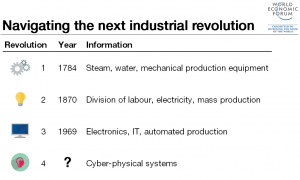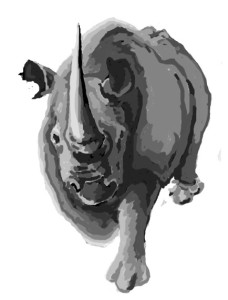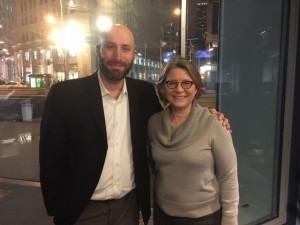Why do we choose to ignore pending doom? Good question! I had a great time talking with Justin Kaufman on his WGN Radio show, “The Download,” on March 31 here in Chicago, about THE GRAY RHINO, financial meltdowns, kicking the can, climate change, and the tricks our minds play on us with LISTEN HERE. That’s Michigan Avenue in the backdrop of the photo.
Author: Michele Wucker
PCMA Convening Leaders Interview
Here’s a brief interview with me talking about gray rhinos, done a few minutes after my presentation at PCMA Convening Leaders in Vancouver January 11, 2016,about how use the gray rhino concept to help your organization act on obvious dangers instead of avoiding them.
World Economic Forum Agenda: The Gray Rhinos of 2016
The top right hand quadrant of the World Economic Forum’s annual Global Risks Report is home to highly likely, high impact dangers that have not been resolved: climate change, weapons of mass destruction, water scarcity, mass forced migration, and energy price shocks. All too often, policy and business leaders neglect risks like these even after recognizing them.

I call these risks “Gray Rhinos”: large, dangerous and heading straight for us. Unlike a certain large fowl that people can only envision if it’s the right colour, black rhinos are no more black in colour than white rhinos are white. They are all grey: something that is so obvious, yet too often missed.
Since I introduced the concept of the Gray Rhino at a Thinking Ahead talk at Davos in 2013, conversations with leaders around the world have helped me develop a framework to understand the progression of Gray Rhinos and strategies for overcoming them. This framework can improve our ability to confront large-scale risks in business, organizations and policy-making.
I’ve expanded the concept for the World Economic Forum Agenda, applying the Gray Rhino framework to the top 10 risks for 2016 identified in the Global Risks Report. Read more HERE.
World Economic Forum Agenda: Will Migrants and Robots Compete for Jobs?
 Throughout history, technological breakthroughs have created industrial revolutions that have shaped not only how we produce goods and services but also the movement of people around the world. The Fourth Industrial Revolution, also known as the New Machine Age, is no different. As increasing automation makes some jobs obsolete and additive manufacturing moves industries and jobs across national borders, these technological changes will upend the politics and economics of global labour migration. In an article for the World Economic Forum Agenda, “Will migrants and robots be competing for the same jobs?” published on November 10, 2015, I reflected on the challenges these changes will present.
Throughout history, technological breakthroughs have created industrial revolutions that have shaped not only how we produce goods and services but also the movement of people around the world. The Fourth Industrial Revolution, also known as the New Machine Age, is no different. As increasing automation makes some jobs obsolete and additive manufacturing moves industries and jobs across national borders, these technological changes will upend the politics and economics of global labour migration. In an article for the World Economic Forum Agenda, “Will migrants and robots be competing for the same jobs?” published on November 10, 2015, I reflected on the challenges these changes will present.
Foreign Policy: The Dominican Republic, Haiti and Historical Legacy
The Dominican Republic, as it did nearly 80 years ago when offering Jewish refugees visas after the dictator Rafael Trujillo ordered an ethnic cleansing at the Haitian border, is trying to polish its international reputation after carrying out human rights violations condemned around the world. This time, it still has a chance to do the right thing by changing its policies on deportation and denationalization. My thoughts in Foreign Policy on October 8, 2015, about the country’s attempt to gloss over 11 counts of violations of the commitments it made under the American Convention on Human Rights, on which it has reneged and on what it could do to make things right (and make its public relations consultants’ job easier).
Huffington Post: It’s Not Too Late to Save the Rhino
 World Rhino Day is a reminder each September of the way we often don’t address crucial problems until it is too late, as is the case for the four remaining Northern white rhinos, a sub species facing extinction. But that doesn’t have to be the fate of the rest of the rhinos still walking the earth, as I argue in the Huffington Post.
World Rhino Day is a reminder each September of the way we often don’t address crucial problems until it is too late, as is the case for the four remaining Northern white rhinos, a sub species facing extinction. But that doesn’t have to be the fate of the rest of the rhinos still walking the earth, as I argue in the Huffington Post.
CFR.org on Dominican Republic Expulsions
Sam Koebrich from cfr.org recently interviewed me about the expulsions to Haiti by the Dominican Republic of Dominicans  of Haitian descent and recent migrants. “Deportations in the Dominican Republic,” August 13, 2015. Several people have noted that my approach to the issues avoid hyperbole and focus on constructive suggestions.
of Haitian descent and recent migrants. “Deportations in the Dominican Republic,” August 13, 2015. Several people have noted that my approach to the issues avoid hyperbole and focus on constructive suggestions.
Acento republished the interview in Spanish in the Dominican Republic, prompting a series of tweets and posts to my public Facebook page from Dominicans who refuse to accept any criticism. At least one was outraged by the supposed international plot for “fusion” of the two countries sharing the island of Hispaniola -you know, the same plot that exists only in the mind of Dominican ultra-nationalists. But I don’t mind. They at least spelled my name right.
NPR on Dominican Republic Expulsions
In the latest chapter in a long and complicated history of tensions with neighboring Haiti, the Dominican Republic is poised to deport recent Haitian migrants and expel Dominicans of Haitian descent who have not been able to prove that they were born there. This week, the deadline to apply for “regularization” passed, with many people saying they applied but have not been given proof, and many others having been rejected or having been unable to get past bureaucratic chaos.
National Public Radio’s Audie Cornish interviewed me June 17th, 2015, on All Things Considered about the history of tensions between the Dominican Republic and Haiti, the subject of my first book, WHY THE COCKS FIGHT: Dominicans, Haitians, and the Struggle for Hispaniola. You can listen to the interview and read the transcript HERE.
For additional information about the history of the two countries and current efforts by Dominicans and Haitians to overcome the past, please visit www.borderoflights.org.
I highly recommend Edwidge Danticat’s The Farming of Bones, a novel about the 1937 massacre, and Julia Alvarez’s A Wedding in Haiti, a contemporary and nuanced account of relationships among Dominicans and Haitians.
